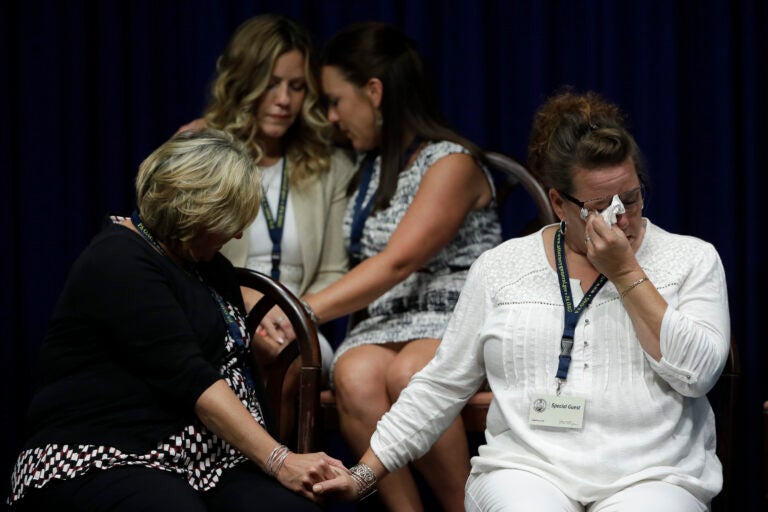Slew of church abuse lawsuits hinges on Pa. court decision
The rush to the courthouse is tied to a landmark grand jury report issued two years ago that documented seven decades of child molestation within the Catholic church in Pa.

FILE - In this Aug. 14, 2018, file photo, victims of clergy sexual abuse, or their family members, react as Pennsylvania Attorney General Josh Shapiro speaks during a news conference at the State Capitol in Harrisburg, Pa. Pennsylvania Roman Catholic dioceses are facing recent lawsuits from people hoping a court decision in 2019 has shown a way around time limits for filing litigation. (AP Photo/Matt Rourke, File)
Pennsylvania’s Roman Catholic dioceses have been hit with about 150 lawsuits from people who say they were sexually abused as children by priests and hope a state court decision last year has shown a way around time limits for legal claims.
Lawyers involved in the litigation say they were still getting notified about new cases on Thursday and expect dozens more.
The rush to the courthouse is tied to a landmark grand jury report issued exactly two years ago that documented seven decades of child molestation within the Catholic church in Pennsylvania. State civil litigation rules generally require legal action to be initiated within two years from when someone realizes they’ve been harmed.
The bulk of the new cases were filed against the Pittsburgh, Allentown, Scranton and Philadelphia dioceses, but the roughly 150 lawsuits reach all eight dioceses.
“Over the past 30, 60 days the number of similar filings has mushroomed” as the two-year anniversary of the report neared, said David Dye, a lawyer for the Pennsylvania Catholic Conference.
The new lawsuits build on an intermediate appellate court’s June 2019 ruling that permitted Renee Rice to pursue her lawsuit against the Altoona-Johnstown Diocese, a case that had been dismissed by a Blair County judge in 2017 because the statute of limitations had long expired. Rice said she had been sexually abused by the Rev. Charles Bodziak, a Roman Catholic priest in Altoona, and that church officials had covered it up.
The Associated Press typically does not name people who say they are victims of sexual assault unless they want to be identified, and Rice has indicated she does. Bodziak has previously denied the allegation, and his lawyer did not return a message left Thurdsay.
The lower court ruled Rice can try to persuade a jury that church officials’ silence about the priest amounted to fraudulent concealment and that the diocese may have “induced” Rice “to relax her vigilance or to deviate from her right of inquiry” by not disclosing information about Bodziak’s history or efforts to cover it up, the Superior Court said.
Casey Coyle, a lawyer for the Scranton Diocese, said the grand jury report’s Friday anniversary has fueled the new lawsuits that lean heavily on the Rice decision. Filing a lawsuit within two years of the report — arguing the report alerted the victim to a previously unknown harm — could insulate the case against being thrown out on statute-of-limitations grounds.
“The plaintiffs, to try to get around the staleness of the claims, they all allege that they did not know about a particular cause of action or a particular harm” before the 2018 grand jury report, Coyle said.
Rice’s lawyer, Richard Serbin, said he’s filed about a half-dozen lawsuits that rely heavily on the Rice decision over the past couple weeks.
“Who knew, before the release of that report, of the conspiracy within each of the dioceses in Pennsylvania, indeed the entire church, to cover up the child sex abuse crisis?” Serbin said. “So it was only upon release of that information that the people I’m representing … became aware of the crisis and the fraud that had been committed.”
The state Supreme Court in March said it would review the Superior Court’s decision that gave Rice, now 52, the ability to sue for abuse she said occurred for several years when she was a child, ending in 1981. The high court could hear oral arguments in the case as early as October.
Lawyers for the Scranton Diocese said in a brief filed in late May that, at that time, it was the defendant in five of 25 civil lawsuits “that all raise the same, or substantially the same, theories and claims” since the Superior Court decision was issued in the Rice case.
Scranton has since been sued about 25 more times.
“If lawsuits like this are continuing or allowed to continue, really, I think every diocese in Pennsylvania will strongly consider bankruptcy and I assume many of them will go that route,” said Matt Haverstick, a lawyer for the Harrisburg and Greensburg dioceses. Harrisburg’s diocese is currently going through bankruptcy proceedings.
Republicans in the Pennsylvania Senate have blocked legislation to allow a two-year window for child sexual abuse lawsuits that are otherwise too old to pursue under the state’s existing lawsuit rules. Instead, the General Assembly began a lengthy process to amend the state constitution to permit such a window.
Under the law passed last year, victims have — going forward — until they turn 55 to sue for abuse, compared to age 30 in current law. Young adults ages 18-23 have until age 30 to sue, where prior law gave them just two years.
Lawmakers in November did pass a number of changes related to future abuse, including providing more time for prosecutors to pursue criminal cases and more time for victims to sue. Most of the state’s dioceses recently opened compensation funds that have paid out millions to victims of priest molestation.

Get daily updates from WHYY News!
WHYY is your source for fact-based, in-depth journalism and information. As a nonprofit organization, we rely on financial support from readers like you. Please give today.




